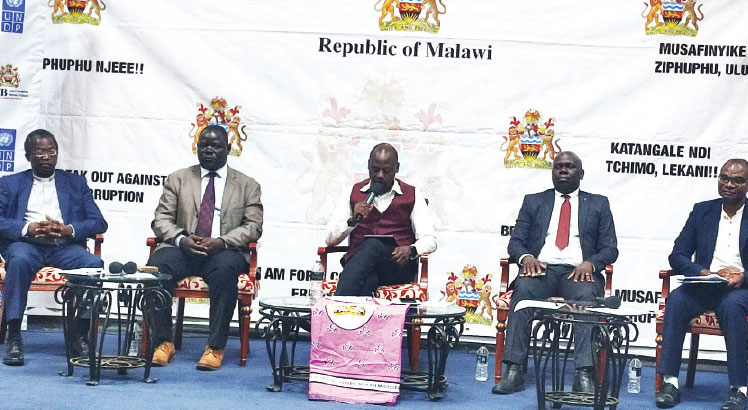As the Anti-Corruption Bureau (ACB) celebrated its 25th anniversary, political interference has remained a top concern hindering its operations.
Some experts expressed their sentiments in Lilongwe on Friday evening when the ACB held a public debate as part of its 25th anniversary commemorations to reflect on its role in the fight against corruption.
However, ACB deputy director general Hillary Chilomba pointed out that the blame for the prevalence of corruption doesn’t rest solely with the government but also extends to the citizens.
“The major problem we have is that people, despite hearing about corruption and its impact on social services, have entrenched the idea that even to access public services, you have to provide an incentive. This is where the root cause of the issue lies,” he argued.
Engineer Gerald Khonje from National Construction Industry Council, health rights activist George Jobe, education policy expert Limbani Nsapato, Evangelical Association of Malawi’s Reverend Francis Mkandawire and Traditional Authority (T/A) Mizinga of Machinga District shared their perspectives on the ACB’s 25-year journey.
Experts reflect on the ACB’s 25-year journey
Nsapato said ACB efforts are largely affected by political interference which is evident in frequent changes of the ACB Director General and threats to ACB officials and whistle-blowers.
“Politicians should stay away from ACB, let it work independently and there is a need to beef up security of ACB officials because their protection is essential. Apart from that we need laws to protect whistle-blowers,” he said.
Nsapato also bemoaned the pervasive influence of corruption in the education sector.
He explained that corruption results in lower education standards, proliferation of subpar private schools in impoverished areas, poor infrastructure and lack of teaching and learning materials.
“Given the education infrastructure budget allocation, it’s inconceivable that we’re still discussing learning under trees or in makeshift classrooms. It’s evident that money allocated to these projects disappears due to corruption,” argued Nsapato.
On his part, Khonje acknowledged ACB’s efforts in addressing corruption within the sector.
He explained: “We have examples of where the ACB has tried its best to uproot corruption in the construction industry. However, there’s a need for more civic education on the processes of construction projects so that people can effectively monitor what their contractors are doing.”
Jobe highlighted the bureau’s challenges in demonstrating the consequences of corruption.
“In the health sector, corruption leads to a shortage of drugs and subpar health services. In the construction industry, it results in substandard infrastructure that poses risks to people. In the agriculture sector, it leads to poor harvests and hunger,” he explained.
Jobe noted that despite the introduction of mechanisms like the hospital ombudsman, suggestion boxes, quality management units and anti-drug theft units in the health sector, corruption continues to flourish.
“Uncompleted hospital projects, cancelled or halted procurement contracts, medical personnel demanding money from patients and consistent drug stock-outs and pilferage underscore the on-going challenges,” he added.
Reverend Mkandawire criticised the clergy’s role in perpetuating corruption by accepting money or goods that they know are proceeds of corrupt practices.
He, however, added that church leaders have now committed to leading the fight against corruption.
T/A Mizinga urged the ACB to strengthen local-level committees such as constituency development committees, district development committees and village development committees, to effectively monitor local development projects.
While acknowledging the ACB’s institutional challenges, the panellists commended the bureau for raising awareness and making high-profile arrests.
They also stressed the need for expeditious investigations and prosecutions of corruption cases.
In an interview following the debate, Chilomba affirmed the ACB’s commitment to addressing the issues raised by experts, pledging to take appropriate action to enhance its functionality moving forward.
The post Political interference remains ACB’s major challenge, claim experts appeared first on The Nation Online.
 Moni Malawi
Moni Malawi 
